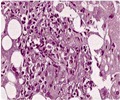Heart complications such as stroke, heart failure or death are more severe in patients with bacterial pneumonia than in patients with viral pneumonia.

‘颷acterial pneumonia is more dangerous because the bacteria is known to cause more inflammation in the arteries compared to its viral counterpart�.’





"We've always known pneumonia was a risk factor for a major adverse cardiac event, like a heart attack, within the first 90 days of being diagnosed," said J. Brent Muhlestein, MD, a cardiovascular researcher with the Intermountain Heart Institute at Intermountain Medical Center. "What we didn't know was which type of pneumonia was more dangerous. The results of this study provided a clear answer, which will allow physicians to better monitor patients and focus on reducing their risk of a major adverse cardiac event." Results of the study will be presented during the American Heart Association Scientific Sessions in Chicago on Sunday, Nov. 11, at 10:30 a.m. CT.
The Intermountain Heart Institute at Intermountain Medical Center is part of the Intermountain Healthcare system based in Salt Lake City.
The study evaluated 4,792 patients diagnosed with pneumonia who were hospitalized at one of Intermountain Healthcare's 23 hospitals between January 2007 and May 2014. Each patient was followed for 90 days and tracked for non-fatal heart attacks, stroke, heart failure, or death.
Nearly 80 percent of the patients were diagnosed with bacterial pneumonia, and 34 percent (1,270 patients) of them had a major cardiovascular event within 90 days. At the same time, 21 percent of the patients were diagnosed with viral pneumonia, and 26 percent (258 patients) had a major adverse event within the 90-day window.
Advertisement
When arteries become inflamed, it destabilizes the layers of plaque that have built up over the years. The unstable plaque can then break loose from the artery wall and cause a blockage, which leads to a heart attack, stroke, or death.
Advertisement
People with known plaque buildup should be especially mindful of things they can do to prevent respiratory infections. Dr. Muhlestein recommends getting a flu shot, a pneumovax, practicing proper hand hygiene year-round (and especially during cold and flu season), and quitting smoking immediately.
Source-Eurekalert














